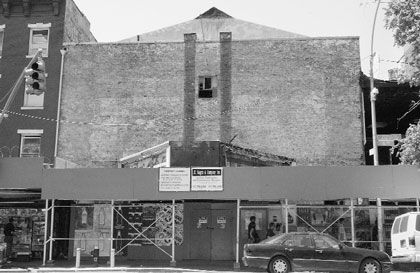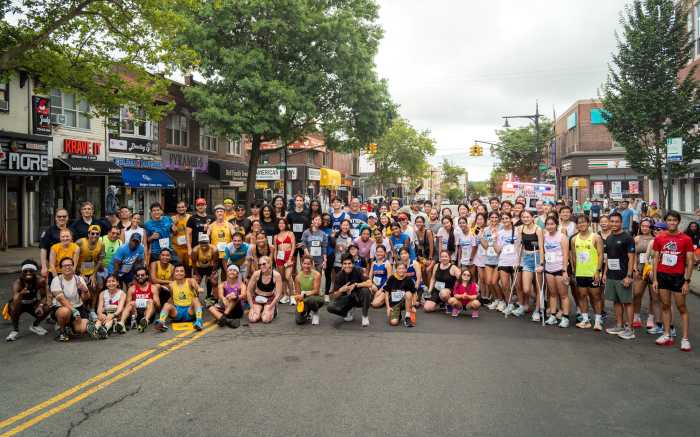By Rania Richardson
The West Village is poised for major improvements that could help transform the environment on Sixth Ave. around W. Fourth St. from seedy to sophisticated.
Last month, a construction bridge appeared at the old Waverly Theater, signaling movement on the work to renovate the space into the IFC Center, an art house associated with the Independent Film Channel. The Center’s target fall opening is highly anticipated by a community frustrated with the present conditions in the area.
Boarded up since late 2001, the Waverly became a space for the homeless to congregate. “It looked like a shantytown,” said David Gruber, president of the Carmine Street Block Association.
When a third adult video store opened on the block earlier this year, the area appeared to be taking a turn for worse, with the strip from Bleecker to W. Fourth Sts. home to tattoo parlors, fast-food restaurant chains and two other sex-related stores. Garish signs and offensive window displays, coupled with the influx of homeless people sleeping in Father Demo Sq. — among a proliferation of pigeons and their droppings — were a sad reminder of the state of this historic neighborhood.
The Waverly, built in 1937, is now being gutted to create a three-screen theater, editing suites for local filmmakers and a cafe. The Center will host panel discussions and events in an effort to expand the audience for independent film. “Our plans are to be respectful to the landmark theater, but to modernize it,” said a spokesperson for IFC.
There will also be a cafe in a former storefront next to the theater, for which IFC hopes to get a liquor license. A courtyard behind the theater is being renovated but will not be used for events, according to an attorney for IFC.
Bogdanow Partners Architects have designed the space. Their credits include the Tribeca Grand Screening Room and V2 Editing, as well as restaurants, such as City Hall on Duane St. in Tribeca. The plan includes housing the original neon sign inside the space, in homage to the neighborhood’s once-beloved theater.
As an early destination for foreign films and venue for the “Rocky Horror Picture Show” cult following, the theater had a name that never lost its cache, even after the single screen was split into two in the 1980s, with a cramped upper balcony and the programming of commercial fare. The Waverly’s final owner was Clearview Cinemas, owned by Cablevision Systems Corp. Cablevision is also the parent of IFC Companies.
Films that IFC has released in theaters range from the popular “My Big Fat Greek Wedding” to the sexy Mexican comedy “Y Tu Mamá También” to the current underground hit “The Saddest Music in the World.” The particulars on the Center’s programming and ticketing will be announced in the upcoming months.
According to Aubrey Lees, Community Board 2’s former chairperson and current Parks Committee chairperson, the renovation of the theater is “a good start to take back the block,” following the proliferation of stores that got pushed down from Times Sq. “Greenwich Village is perceived as tolerant and there is an assumption that the neighborhood has a laissez-faire attitude [towards these stores],” she commented.
“This is not a red-light district,” said Gruber. “These stores are not respectful of the community.” He added that the Sixth Police Precinct is monitoring the stores, but zoning laws need to be enforced.
Stores on this strip of Sixth Ave. are allowed to sell merchandise of a sexual nature, but only if at least 40 percent of their store’s merchandise is non-sexual, under the so-called 60/40 Law. However, according to Councilmember Christine Quinn’s office, there have been “numerous complaints” that a new store, Xcellent DVD, is having live sex shows, which isn’t allowed under the area’s zoning. A Quinn spokesperson said they have asked that a Department of Buildings inspector be sent to check out the complaints and that the zoning should be enforced, but so far the inspector hasn’t visited the premises.
Quinn’s office is currently organizing a letter-writing campaign for residents to contact the mayor and the commissioner of the Department of Buildings.
The revamping of nearby Father Demo Sq. is another important improvement scheduled for the neighborhood. Lees confirmed that Community Board 2 has fully approved the renovation plans for the triangular plaza at the intersection of Bleecker and Carmine Sts. and Sixth Ave. Work will hopefully begin in the fall with completion next June. The almost $1 million renovation budget will include an expansion of the space by 7 ft. into Bleecker St. and by 3 1/2 ft. into Carmine St., a move to improve traffic in the area as well as to provide a walkway around the newly gated plaza. The 3-ft.-high gate will be locked by police sometime after midnight, as the plaza will now have a curfew.
This should help curtail noise and security complaints, according to the plan’s advocates.
The low barrier with very wide doors was designed to give the space a piazza feeling when open. The plaza will also have new benches, a fountain, tinted asphalt hexagonal pavers, Coho-style subsurface lights, flower beds, new sub-irrigation and more trees. An information board will include a bas-relief likeness of Father Demo — the former priest of Our Lady of Pompeii Church — and a narrative on his contribution and the Italian immigrant contribution to the Village, tastefully done.
The IFC Center, the campaign to end the sex-related stores and the renovation of Father Demo Sq. are a few of the signs that point to what Gruber calls, “the renaissance of Sixth Ave.”






























